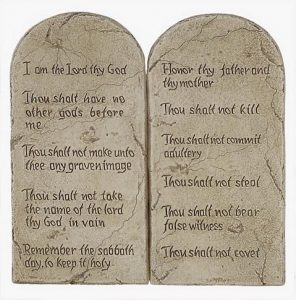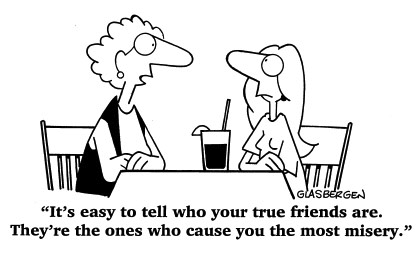====================
A “Rector’s Reflection” by the Rev. Dr. C. Eric Funston to be published in the February 2017 issue of The Epistle, the monthly newsletter of St. Paul’s Episcopal Church, Medina, Ohio, where Fr. Funston is rector.
====================
Introduction
 In a New York Times editorial, Frank Bruni said:
In a New York Times editorial, Frank Bruni said:
[O]ne of the fundamental challenges will be to respond to [President Trump], his abettors and his agenda in the most tactically prudent way and not just the most emotionally satisfying one. To rant less and organize more. To resist taunts and stick with facts. To answer invective with intelligence.
And to show, in the process, that there are two very different sets of values here, manifest in two very distinct modes of discourse. (The Wrong Way to Take On Trump, January 24, 2017)
In recent conversations (and, truth be told, in conversations stretching back years) about politics, about religion, about a number of things, I have found this to be true. That one must bite one’s tongue (sometimes to the point of blood) and bridle one’s temper (also to the point of bleeding) so that one does not participate in devolving the discussion into the depths of a donnybrook.
It has seemed to me most recently that a way to avoid this (the devolution, not the alliteration) is to have in mind a clear differentiation of fact, opinion, and belief. For example, I recognized some time ago that I could not discuss economics and governmental finance with a clergy colleague (not in my diocese) with whom I’ve been friends for many years. He has completely accepted the veracity of the theories of Friedrich Hayek and Ludwig von Mises, the economists behind the so-called Austrian school of economics. It is their thinking that underlies that darling of the conservative Right, “trickle-down” or “supply-side” economics.
My friend, and so many on that side of the political spectrum, hold to these theories despite the fact that they are not only unproven, they demonstrably disproven. The governmental policies based on them – tax cuts for the wealthy which were supposed to create thousands of jobs but did not, austerity policies which were to rescue failing economies such as Greece but did not, and their new incarnation in the notion of privatization of education (a favorite idea of Secretary-designate of Education DeVos) and of infrastructure (likely to be an element of the Trump administration plan) – have not worked in this or any other country in which they have been implemented.
Nonetheless, my friend and many conservative Republicans continue to hold, with an almost religious fervor, a bed-rock reliance on the Austrian school theories, policies, and programs; they are, for them, absolutely true. It seems to me, however, that they are “true” not in the sense that facts are “true,” but in the manner in which “beliefs” are “true.” They certainly hold them with a strength with which one would not hold a mere opinion. And, it seems to me, that there are many other notions held by those on both right and left which are of this nature.
As a clergyman who believes most firmly that Jesus meant what he said when speaking to “the Jews who had believed in him” saying, “You will know the truth, and the truth will make you free,” (Jn 8:31-32), and who believes it is my duty not only to proclaim truth as I understand it, but also to teach my congregants to discern truth for themselves, and also as one who agrees with Mr. Bruni, I have written (lightly and engagingly, I hope) the following essay as my “Rector’s Reflection” for the upcoming issue of our parish newsletter. In it, I try to distinguish between fact, opinion, and belief, and conclude with some ways (strategies, if you will) in which to engage in conversation that respect (or, at least, understand) the distinctions between them.
Rector’s Reflection: Facts, Opinions, Beliefs (February 2017 parish newsletter, St. Paul’s Episcopal Church, Medina, Ohio)
A short while ago I was in a conversation in which I stated a fact (see below) but to which the person I was talking with responded, “Well, that’s just your opinion.” No, I replied, it’s a verifiable scientific fact.
The conversation reminded me of the several I have had over the years with avowed atheists who have labeled my belief in God as an “opinion.” No, I reply, it’s a belief. My free-thinking friends seem not to appreciate the difference. So, too, the person with whom I was recently speaking did not seem to be aware of the difference between a fact and an opinion.
When a high presidential adviser a few days ago used the term “alternative facts” in a news interview, these conversations and this confusion about what is a fact, what is an opinion, and what is a belief came immediately to mind.
I’m not an academically trained philosopher, although I’ve taken my share (maybe more than my share) of philosophy courses in college and graduate school. I’m also not an academic theologian; I’m more a practical, arm-chair theologian sitting with (as Karl Barth might have said) the Bible in one hand, the newspaper (or, actually, my laptop computer) in the other, and trying to make sense of both armed with a little bit more than the usual amount of theological book learning. So what I’m about to write is a matter of considered and educated opinion.
It’s also something a work in progress. What I am about to write is what I think about these subjects today (January 25, 2017, by the way); I invite you to explore them with me and maybe both of us will think something rather different a month or a year or a decade from now.
So . . . there are these three things: facts, opinions, and beliefs. This is what I understand them to be.
A fact is (and this is straight from a dictionary) “something that actually exists; reality; truth.” I’m going to steer away from the last word in the definition for a moment, but I will come back to it. A fact actually exists in reality. It is something empirically and objectively provable. Water is made up of oxygen and hydrogen; that’s a fact. The earth orbits the sun; that’s a fact. I was born on September 29, 1952; that’s a fact. Everyone can agree on facts.
An opinion is defined in the dictionary as “a judgment that rests on grounds insufficient to produce complete certainty; a personal view, attitude, or appraisal.” I have edited that definition to take out the suggestion that “opinion” and “belief” are equivalent (see below). I come from a legal background in which “opinion” also means the judgment of a court which carries the force of law, making such opinions almost as solidly grounded as facts. In the course of my practice in healthcare law, I also came to rely on physicians’ medical opinions which almost carry the weight of beliefs (see below). Most of our opinions, however, are somewhere in between; they are grounded on facts, colored by our beliefs, and should represent our considered judgment about the nature of reality. Fish is generally inedible; that’s my opinion. The music of composer Olivier Messiaen is unendurable; again, my opinion. Curling is a fascinating sport; another opinion. Despite the origin of the word, opinions are certainly not flights of fantasy to be dismissed simply as “your opinion” and worthy of no consideration; opinions on matters great and small, as personal appraisals of our reality, are the way we navigate through life!
A belief is, according to the dictionary I’m looking at, “something believed; an opinion,” and the illustration given is “a belief that the earth is flat.” I’m going to flatly reject that definition and suggest that the acceptance of the notion that the earth is flat is not a “belief” nor is it an “opinion;” it is a rejection of scientifically verifiable fact; it is a delusion. So what is a belief? The dictionary also defines it to be “confidence in the truth or existence of something not immediately susceptible to rigorous proof; confidence; faith; trust.” This is an acceptable definition, particularly those last two words!
I always keep in mind that “belief” is related linguistically to the word “beloved.” The Latin word for “opinion” was opinio which carries with it a hint of unreality. I recall reading a book on Hispanic fiction which equated opinions with “the organizing principles of private fantasy” and Thomas More, author of Utopia, created the word existimation to translate it in regard to one’s self-conceived reputation. On the other hand, the Latin word for “belief” was fides (usually translated as “faith”) or confidentia (usually translated as “confidence”), while the Latin verb “to believe” is credere, meaning “to rely on” and is related (like “beloved”) to the word for “heart”: in other words, what we believe is what we stake our hearts upon. For this reason, I do not equate “opinions” with “beliefs.”
Beliefs to the believer are as fundamentally certain as facts. Beliefs are not scientifically or historically verifiable like facts, but to the one who holds them they are just as true. This is why I steered away from using the word “truth” in regard to defining “fact.” Facts are one form of truth; beliefs are another. In post-modern thought, beliefs are the truths which may differ amongst persons. Facts are objective truths on which all may agree; beliefs are subjective truths on which we may differ; neither is likely to be changed by argument. Opinions, however, may be.
Beliefs and facts share the characteristic that they are subject to disproof. For centuries human beings held as fact the notion that the sun revolved around the earth; that was an objectively observable, verifiable phenomenon everyone saw every day. But that “fact” was disputed by the ancient astronomer Aristarchus in about 270 BCE and by Nicolaus Copernicus in the 16th Century; both stricter observation and mathematics proved the “fact” to be false. Were one to accept still the notion that the earth is the center of the universe, that idea would not be a fact; it would not be a belief; it would not be an opinion. It would be a delusion.
In our conversations, let us resolve to accept objectively verifiable facts; where we are wrong about facts, we must be willing to accept correction. Let us also resolve to be respectful of one another’s beliefs remembering that these are matters of heart-invested trust. As to opinions, let us be gracious when challenged; let’s remember the title of that book written by the great theologian Snoopy, Has It Ever Occurred to You that You Might Be Wrong?
I am sure that there will be many conversations with family, friends, fellow Christians, and others in which these admonitions will be tested! Keep in mind the British motivational poster from World War II, “Keep Calm and Carry On”!
Afterward
Given what I had to say above about my clergy friend’s acceptance of the Austrian school economic theories, you’ve probably figured out that I hold his “beliefs” to be delusions. Unfortunately, I’m afraid that those who are deluded about that and many other things now hold the reins of government in this country. This is why I strongly, and fearfully, believe that Mr. Bruni was correct in his New York Times editorial when he concluded that if the level of public discourse is allowed to pass into derangement, “Trump may be victorious in more than setting newly coarse terms for our political debate. He may indeed win on many fronts, over many years.” (Ibid.)
The ministry of clergy in all traditions to proclaim the truth as we understand it and to teach our people to discern it for themselves has become even more important and urgent.
====================
Father Funston is the rector of St. Paul’s Episcopal Church, Medina, Ohio.
 Today’s Gradual, Psalm 85, includes what may be my favorite verse in the entire collection of the Psalms: “Mercy and truth have met together; righteousness and peace have kissed each other.” (v. 10)
Today’s Gradual, Psalm 85, includes what may be my favorite verse in the entire collection of the Psalms: “Mercy and truth have met together; righteousness and peace have kissed each other.” (v. 10) I’m wearing an orange stole today and a couple of you asked me on the way into church, “What season is orange?” Well, it’s not a seasonal stole … although I suppose we could say it commemorates the season of unregulated and out of control gun violence. A few years ago, a young woman named Hadiya Pendleton was shot and killed in Chicago; her friends began wearing orange, like hunters wear for safety, in her honor on her birthday in June. A couple of years ago, Bishops Against Gun Violence, an Episcopal group, became a co-sponsor of Wear Orange Day and some of us clergy here in Ohio decided to make and wear orange stoles on the following Sunday. Our decision got press notice and spread to clergy of several denominations all over the country.
I’m wearing an orange stole today and a couple of you asked me on the way into church, “What season is orange?” Well, it’s not a seasonal stole … although I suppose we could say it commemorates the season of unregulated and out of control gun violence. A few years ago, a young woman named Hadiya Pendleton was shot and killed in Chicago; her friends began wearing orange, like hunters wear for safety, in her honor on her birthday in June. A couple of years ago, Bishops Against Gun Violence, an Episcopal group, became a co-sponsor of Wear Orange Day and some of us clergy here in Ohio decided to make and wear orange stoles on the following Sunday. Our decision got press notice and spread to clergy of several denominations all over the country.  In a New York Times editorial, Frank Bruni said:
In a New York Times editorial, Frank Bruni said: It’s April! When did that happen?
It’s April! When did that happen?



